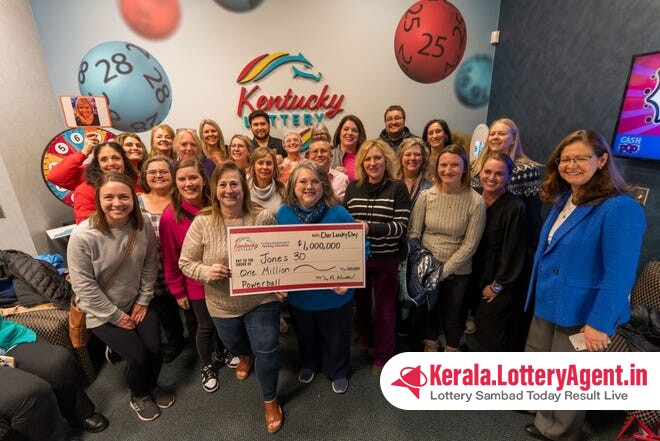
It was a moment that fused the ordinary routine of daily life with extraordinary luck for a group of 30 educators. Fondly calling themselves the “Jones 30,” these current and former employees of Rector A. Jones Middle School in Florence, Kentucky, found their steadfast gambling strategy rewarded with a sensational $1 million Powerball jackpot. The winning ticket, harboring the secret to their newfound wealth, lay inconspicuously within the pages of a math textbook.
On a day like any other, the “Jones 30” made their way to the Kentucky Lottery office, their faces lit with quiet anticipation. Amid the echoes of cheerful roars that resonated in the lobby, it became evident that the seemingly lifeless stretch of ordinary teaching days was about to change. This close-knit band of present and past middle school workers—comprising teachers, counselors, administration staff, and even the school nurse—stood united, much as they had in their professional roles, except now, they were bound by an incredible stroke of luck.
It was the retired math teacher who safeguarded the ticket inside a math textbook on page 200—an ingenious strategy under the premise, “No one looks in a math book.” The joyous act of confirming the numbers for the thousandth time bore the fruit of their dedication and patience.
Their journey to fortune commenced over eight years ago, with a collective dream to hit the jackpot. Each of them shared a history at the middle school, and although some had moved on or retired, their ties remained as strong as ever.
Resembling a plot torn from a novel, it was in 2019 that the group settled on a fixed set of numbers to use in the Powerball draws each week. The selection process, spearheaded by their math teacher and an assistant principal, bore the hallmarks of fate. Numbers were drawn from a hat, and the imperfect initial draw led to a second attempt that would seal their destinies. As it turned out, the re-draw was their golden ticket to prosperity.
Upon victory, the “Jones 30” saw each member receive $24,000 after taxes—a sizable amount that could bolster investment portfolios, facilitate travel, or aid in home improvements. The winners opened up about their shared life experiences over the years, painting a picture of unity beyond the school’s walls: group trips, celebrating the arrival of babies and grandchildren, and the collective joy that has always been part of their union.
The group’s response to their newfound wealth captures the very essence of their bond. A winner’s recount of their past experiences and excitement about the win highlights that it wasn’t just the money that mattered, but the journey and friendship that came with it.
As for the future, the “Jones 30” have no intention of halting their weekly tradition. Playing the lottery together not only offers the thrill of chance but remains a cherished method for these educational comrades to stay connected.
Their story, reminiscent of heartwarming tales where persistence pays off, goes to show that sometimes loyalty—even to a set of randomly chosen numbers—can lead to life-changing moments. The lesson is clear: unity, consistency, and perhaps a pinch of serendipity, can sometimes result in a million-dollar story.












